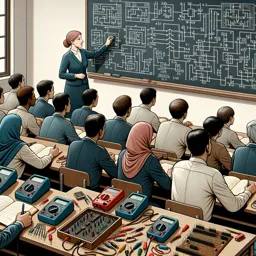Introduction
Moving beyond basic electronic concepts, intermediate electronics opens up a wealth of knowledge in both analog and digital circuits. This level is ideal for those who have a basic grasp of electronics and are eager to deepen their understanding. This guide covers essential topics and practical tips to advance your electronics skills.
Understanding Analog Circuits
Analog circuits deal with continuously variable signals. Components such as amplifiers, filters, and oscillators form the backbone of many audio, radio, and sensor systems. By mastering operational amplifiers (op-amps), passive filters, and feedback systems, you can design and troubleshoot circuits used in professional applications.
Key components include:
- Operational Amplifiers: Learn about common configurations like inverting, non-inverting, and differential amplifiers.
- Signal Conditioning: Experiment with filtering noise using passive and active filters.
- Oscillators: Explore circuit designs for generating waveform signals, such as sine, square, and triangle waves.
Delving into Digital Circuits
Digital electronics use discrete voltage levels to represent binary data. Proficiency in this area includes understanding logic gates, flip-flops, counters, and microcontrollers, which are pivotal for building reliable digital systems.
Key components include:
- Logic Gates: Discover how AND, OR, NOT, NAND, NOR, XOR, and XNOR gates create complex logical functions.
- Sequential Circuits: Use flip-flops and registers for data storage and manipulation.
- Microcontrollers: Gain hands-on experience with programming and interfacing for embedded systems.
Project-Based Learning and Troubleshooting
Building projects bridges theory and practice. Start with kits or online schematics to assemble audio amplifiers, timing circuits, or microcontroller-based controllers. Learn troubleshooting strategies by using a multimeter or oscilloscope to diagnose issues, tracing signal paths, and interpreting datasheets to solve real-world problems.
Tips to Advance Further
- Practice schematic reading and simulate circuits using free software.
- Stay safe: Always follow proper safety guidelines when working with electrical components.
- Join electronics communities and forums to share challenges and discoveries.
Intermediate electronics is a rewarding stepping stone. With constantly evolving technology, this journey offers ongoing discovery and growth.































